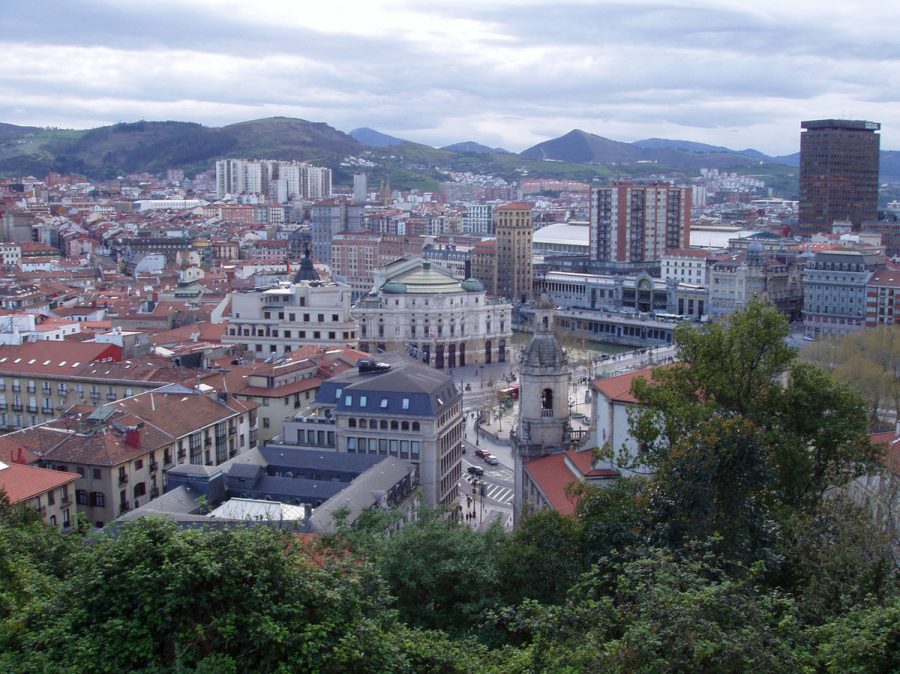Opinion | Misperception of severity, cultural habits exacerbate pandemic
An overlook view of Bilbao, Spain on Jan. 5, 2008.
April 12, 2020
The coronavirus had no one worried in Bilbao, Spain. They continued business as usual as if no plague was brewing in the virosphere: until they couldn’t ignore it any longer. The coronavirus had no one worried in Bilbao, Spain.
The coronavirus has changed the world more rapidly than anyone could have anticipated. In Basque Country, where I planned to spend the entire semester, as of Sunday, March 29th, there were 5,740 cases and 265 deaths, paling in comparison to the 22,677 cases in Madrid and 3,082 deaths, according to the Ministry of Health’s official Twitter.
When anyone studies abroad, they invariably notice cultural differences in the food, social customs and mealtimes, among others. Washing one’s hands, I noticed early on, was not nearly as common as it is in the United States. This difference in hygiene later proved important, clearly, in the development of the COVID-19 pandemic.
I lost count of how many times I saw people leaving public restrooms without washing their hands. The conditions for hand hygiene, it turned out, were not very comfortable; there was only cold water available, no paper towels and dispensers filled with soap only about 60% of the time.
Another thing I noticed was how people sneezed and coughed: into their HANDS! In Belgium, even, as I was buying some of that famous chocolate, the woman putting my confections in a bag sneezed into her hand, then continued to gather my candy. Gross.
Get The Daily Illini in your inbox!
When I raised these concerns — which other students in my program had made independently — Spaniards seemed to have no idea what I was talking about. And they didn’t see anything wrong with sneezing into one’s hand.
COVID-19 continues to spread around the world at a ferocious pace, but I firmly believe the general scarcity of hand hygiene in Spain (as well as Italy) has contributed greatly to the proliferation of the virus.
Now, my host family, as well as the other 46 million citizens of Spain, are on full lockdown. Permitted only to leave their houses to buy food and medicine. The order was put in place only a few short days after I left.
On Wednesday, I went to bed with plans to wake up and leisurely acquire a croissant and cup of coffee from my favorite bakery. When I went to bed that night, I had no idea I would be woken up suddenly at 6 a.m. and be told to pack my things and leave, immediately.
My parents were visiting and my brother had just boarded a flight on his way to meet us. As he got situated, everyone’s phones started blowing up with President Trump’s 30-day travel ban on Europe. 80% of the passengers disembarked before they had left the gate.
My brother called my parents at 2:30 a.m. Spain time telling them to leave Europe. They bought three tickets, packed their things and went to my host family’s apartment to wake me up and tell me our flight was at 11:30.
I had no time to say goodbye to my host family, the friends I had made, the river, the famous Guggenheim Museum or the University of Deusto. I had 15 minutes to freak out on the couch before I had to pack up and leave. I only had time to say a quick goodbye to my favorite bakery.
However, the behavior of the people of Bilbao struck me most amidst what felt like my exodus leaving for the airport. The streets were full, people were shopping and going out to eat and going out to work. It was heart-wrenching to leave when everything seemed so positively normal.
My untimely exit, though, was the first sign to my host family that this crisis — this pandemic — was real. It was not a joke or a media hoax. And it was about to change the world.
My heart broke watching the streets of my beautiful host country empty, restaurants and pintxo bars shutter, people dying even faster than anticipated and healthcare workers become exhausted and sick.
Then, the same thing started to happen to my home country and to my home University. All my homes are sick; our whole world is sad and afraid and anxious.
It was incredibly painful to leave Bilbao, a place I loved with my whole heart, a place in which I felt safe and comfortable and at home, so suddenly. It hurt more than words can express to not say goodbye.
But what hurts more than all of that lack of closure is watching the safety and comfort of that beautiful city, along with the rest of the world, fade away in the wake of this global pandemic.
This will all be over. But it’s OK to mourn. It’s OK to be sad. Especially for us college students, whose lives were canceled right when they were supposed to begin. Coronavirus hasn’t left a life untouched on the planet.
Life will go back to normal, though, even if some aspects of life remain forever changed by the pandemic. I invite you to imagine the joy and gratitude we will all experience at the simple pleasures of, say, going to KAM’s on a beautiful night in September, going for a barbeque at a crowded Black Dog or even just going to an in-person lecture again.
COVID-19 has brought and will continue to bring, bad things to our world. However, every person who lives through this global crisis will likely be gifted with a renewed sense of wonder at parts of life previously deemed toilsome or irritating.
We’ll be able to find beauty in the simple things again, or maybe even for the first time. This too shall pass.
Ellen is a junior in LAS.







